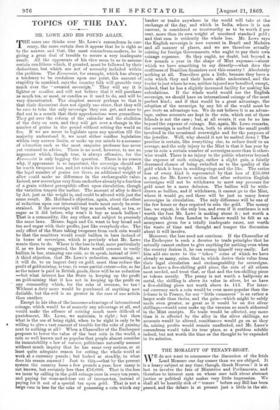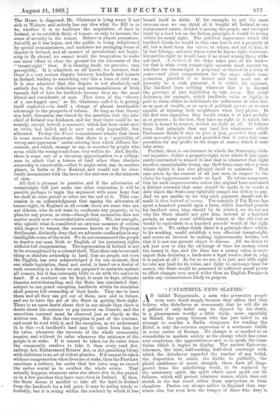THE MORALITY OF TENANT-RIGHT.
WE do not want to commence the discussion of the Irish Land Measure one day sooner than we are obliged. It is a heavy subject at any time, though, thank Heaven 1 it is at last to involve the fate of Ministries and Parliaments, and therefore to interest men on whose ears talk about abstract justice or political right makes very little impression. We shall all be heartily sick of " tenure " before any Bill has been passed, and the debate is at present just a little in the air. The House is dispersed, Mr. Gladstone is lying weary if not sick at Weimer, and nobody has any idea what the Bill is to be, whether it is to facilitate the acquisition of land in Ireland, or to establish fixity of tenure, or only to increase the sense of security in the tenant. Debate is almost premature, but still, as it has begun, and the public is being enlightened by special commissioners, and members are arranging tours of inquiry in Ireland, and all manner of speculations are begin- ning to fly abroad, we cannot avoid the temptation to make one more effort to clear the ground for the advocates of the -" tenant-right " view. It is clearing itself, we perceive, very perceptibly. It is admitted, on all hands, for instance, that there is a very serious dispute between landlords and tenants in Ireland, leading to something very like a form of civil war. It is also admitted that the dispute is not absolutely and entirely due to the wickedness and unreasonableness of Irish tenants, full of hate for landlords because they are the most liberal and considerate of men. That form of the " theory of a one-legged race," as Mr. Gladstone called it, is getting itself exploded,—in itself a change of almost inestimable advantage to the prospects of reform. So long as that theory was held, discussion was closed by the assertion that the mis- chief of Ireland was Irishmen, and for that there could be no remedy, except, indeed, a massacre, which has been tried once or twice, has failed, and is now not only impossible, but abhorred. To-day the Tinges' commissioner admits that there is some cause for discontent, that there is a "possibility of wrong and oppression " under existing laws which diffuses dis- content, and which, strange to say, is resented by people who seem, while the wrong is not done, very well to do. And, finally, there is some sort of a far-away approximation to a willing- ness to admit that a tenure of land other than absolute ownership is conceivable,—that it might exist, say, in another planet, in India or New Zealand, and would not be abso- lutely inconsistent with the laws of the universe or the interests .of man.
All that is pleasant to perceive, and if the adversaries of tenant-right will just make one other concession, it will be possible perhaps to begin the argument with some hope that we shall at some period or other see the end of it. That con- cession is an acknowledgment that among the advocates of tenant-right, in England at all event's, there are some who are not thieves, who do not want to confiscate any property, or to plunder any person, or even—though that accusation does not matter much now—to revolutionize society. We, for example, who uphold what is considered an extreme measure of reform with respect to tenure, the measure known as the Perpetual Settlement, distinctly deny that we advocate confiscation in any intelligible sense of the word. We do not recommend the people to deprive any man, Irish or English, of his pecuniary rights without full compensation. The regeneration of Ireland is not to be accomplished by a colossal theft. That there can be no such thing as absolute ownership in land, that no people, not even the English, has ever acknowledged it for one moment, that our whole legislation, fiscal and social, is based on a denial of such ownership is a thesis we are prepared to maintain against all comers, but it has extremely little to do with the matter in hand. If a contract can be kept, it must be kept, ultimate theories notwithstanding, and the State has contracted that, subject to one grand exception, landlords within its dominion shall possess full ownership of their lands. They are to have them and all they can get out of them, now and in future, and are to have the aid of the State in getting their right. There is no more doubt about that in our minds than there is doubt about the contract to pay interest on Consols, and the unwritten contract must be observed just as closely as the written one. But then the exception is part of the contract, and must be read with it, and the exception, as we understand it, is this :—A landlord's land may be taken from him, for its value, whenever the interests of the whole community require, and without its value whenever the existence of the people is at stake. If it cannot be taken for its value when the community resolves to take it, then every road Act, railway Act, Embarrassed Estates' Act, or Act punishing felony with forfeiture is an act of violent plunder. If it cannot be taken without compensation when lives are at stake, then the PoorLaw sanctions a robbery, for under that law rates may so exceed the entire rental as to swallow the whole estate. That actually happens whenever rates rise above 20s. in the pound, as in a few parishes they have once risen in Ireland. If, then, the State deems it needful to take all the land in Ireland • from the landlords for a full price, it may be acting wisely or foolishly, but it is acting within the contract by which it has bound itself to abide. If, for example, to put the most extreme case we can think of, it bought all Ireland as one embarrassed estate, divided it among the people, and recouped itself by a land tax on the Indian principle, it would be acting within its moral right. The political importance which the landlord thinks he would in that case lose is not a property at all, but a theft from the voters, to whom, and not to him, it by law belongs, and over whose votes he has no right whatever, beyond the right he would have if he stood among them with- out land. A fortiori, if the State takes part of his land— for that is what every tenant-right measure must amount to, whether the tenant-right is perpetual or limited to a term of years—and gives compensation for the same, which com- pensation, provided it is honest and real, need not of necessity be a cash payment, it is within its contract. The landlord loses nothing whatever that it is beyond the province of just legislation to take away. The social deference, for example, which landlords value so highly, is paid to them either as individuals for refinement or what not, or as men of wealth, or as men of political power, or as men capable of injuring their neighbours when they please. In the first two capacities, they would retain it at least as fully as at present ; in the last, they have no right to it which the State is bound to respect, indeed, no right at all. It follows from that principle that any land law whatsoever which Parliament thinks it wise to pass is just, provided that suffi- cient necessity is proved, and provided that it votes full com- pensation for any profits in the shape of money which it may take away.
Further, there is one instance in which the State may, with- out injustice, violate a property-right, even where it has appa- rently contracted to respect it, and that is whenever that right involves unmistakable wrong, say, theft from some other person whose rights it has also pledged itself to maintain. That case arises, by the consent of all just men, in respect to the claim for improvements made on land. To refuse compensa- tion for such improvements, unless the original lease contained a distinct covenant that none should be made, is to evade a debt which the State may rightfully compel the debtor to pay. And we are unable to see why such payment should not be made in time instead of money. For example, if Pat Byrne has spent a hundred pounds upon a farm, which hundred pounds his landlord owes him, should he be evicted, we do not see why the State should not give him, instead of a hundred pounds, as many years' additional tenure at the old rent as would be equivalent to a hundred pounds' worth of the right to raise it. We rather think there is a principle there which, in its working, would establish a very effectual tenant-right, and create an interest in making improvements besides, but that it is not our present object to discuss. All we desire to ask just now is why the exchange of time for money, when the money is due, and the time has a money value, is more unjust than declaring a bank-note a legal tender, that is, why it is unjust at all ? As far as we see, it is just, and with right to take any land for its value, and right to exchange time for money, the State would be possessed of sufficient moral power to effect changes very much wider than an English Premier is under any circumstances likely to propose.































 Previous page
Previous page